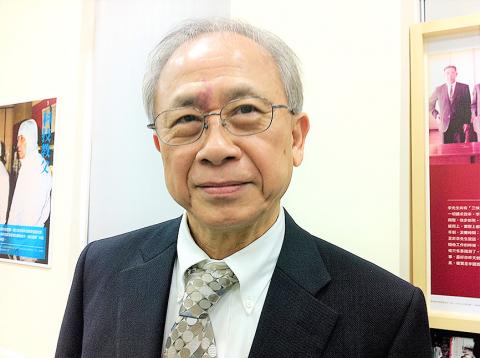Chung-Hua Institution for Economic Research (CIER, 中華經濟研究院) yesterday announced that its chairman, Hu Sheng-cheng (胡勝正), had died of pulmonary calcification on Tuesday evening at National Taiwan University Hospital.
The 77-year-old widely respected academic was survived by his wife and two sons.
Hu had been frail and was recently hospitalized for flu symptoms, his secretary said by telephone.

Photo: Wang Meng-lun, Taipei Times
The Taipei-based think tank is setting up a makeshift memorial hall for people to pay tribute to Hu from today, she said.
With a doctoral degree in economics from the University of Rochester in the US, Hu took the helm of CIER in 2016 at the invitation of President Tsai Ing-wen (蔡英文). He concurrently served as a standing board director at the central bank.
Tsai said Hu’s death was a great loss to the nation.
A native of Yilan, Hu taught at Purdue University for 28 years before returning home to teach at National Taiwan University in 1996. In 2000 he was elected a member of Academia Sinica, the nation’s top research institute.
Hu joined the government in 2001, first serving as minister without portfolio and later heading the Council for Economic Planning and Development (renamed the National Development Council, NDC) and the Financial Supervisory Commission.
Hu had called on the local industry to transform and upgrade, replacing the “Made in Taiwan” model with the “Served by Taiwan” orientation, the NDC said in a statement.
Hu also pushed for equitable distribution of the nation’s wealth and resources, as well as advocated the need for balanced development between rural and urban areas, the council said.
The central bank described Hu as a gentle man, who remained positive even as his health deteriorated after a serious gastrointestinal ailment in 2016.
He passed out during a meeting at the Presidential Office in April last year and was rushed to Mackay Memorial Hospital.
Academics across the political spectrum mourned his death, expressing their admiration for his academic prowess.
Hu gave up a comfortable life in the US and demonstrated great courage by joining the government in a time of tumult, Taiwan Institute of Economic Research (台經院) president Lin Chien-fu (林建甫) said.
As the head of CIER, Hu said the institute would strive for better quality and forward-looking research to help the government, industry and society.
He showed particular concern about the nation’s rapidly aging population, which he said merited serious attention from policymakers and the public so that they could better grasp the issue and make adjustments.

BUSINESS UPDATE: The iPhone assembler said operations outlook is expected to show quarter-on-quarter and year-on-year growth for the second quarter Hon Hai Precision Industry Co (鴻海精密) yesterday reported strong growth in sales last month, potentially raising expectations for iPhone sales while artificial intelligence (AI)-related business booms. The company, which assembles the majority of Apple Inc’s smartphones, reported a 19.03 percent rise in monthly sales to NT$510.9 billion (US$15.78 billion), from NT$429.22 billion in the same period last year. On a monthly basis, sales rose 14.16 percent, it said. The company in a statement said that last month’s revenue was a record-breaking April performance. Hon Hai, known also as Foxconn Technology Group (富士康科技集團), assembles most iPhones, but the company is diversifying its business to

Apple Inc has been developing a homegrown chip to run artificial intelligence (AI) tools in data centers, although it is unclear if the semiconductor would ever be deployed, the Wall Street Journal reported on Monday. The effort would build on Apple’s previous efforts to make in-house chips, which run in its iPhones, Macs and other devices, according to the Journal, which cited unidentified people familiar with the matter. The server project is code-named ACDC (Apple Chips in Data Center) within the company, aiming to utilize Apple’s expertise in chip design for the company’s server infrastructure, the newspaper said. While this initiative has been

GlobalWafers Co (環球晶圓), the world’s No. 3 silicon wafer supplier, yesterday said that revenue would rise moderately in the second half of this year, driven primarily by robust demand for advanced wafers used in high-bandwidth memory (HBM) chips, a key component of artificial intelligence (AI) technology. “The first quarter is the lowest point of this cycle. The second half will be better than the first for the whole semiconductor industry and for GlobalWafers,” chairwoman Doris Hsu (徐秀蘭) said during an online investors’ conference. “HBM would definitely be the key growth driver in the second half,” Hsu said. “That is our big hope

Clambering hand-over-hand, sweat dripping into his eyes, a durian laborer expertly slices a cumbersome fruit from a tree before tossing it down to land with a soft thump in his colleague’s waiting arms about 15m below. Among Thailand’s most famous and lucrative exports, the pungent “king of fruits” is as distinctive in its smell as its spiky green-brown carapace, and has been farmed in the kingdom for hundreds of years. However, a vicious heat wave engulfing Southeast Asia has resulted in smaller yields and spiraling costs, with growers and sellers increasingly panicked as global warming damages the industry. “This year is a crisis,”